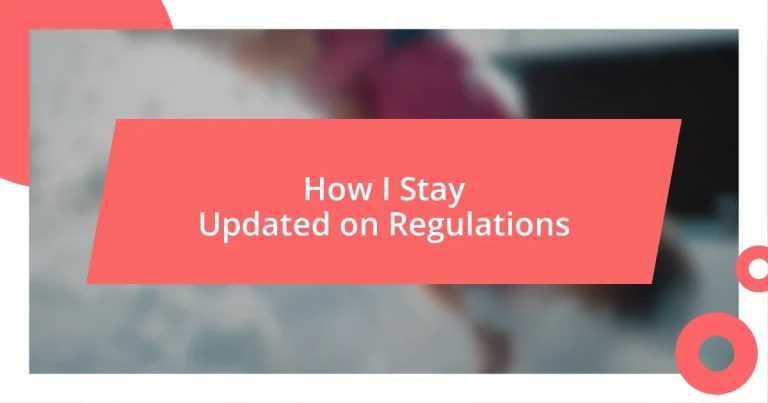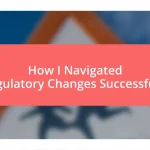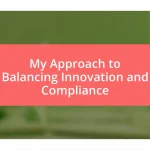Key takeaways:
- Understanding regulations is essential; breaking them down and relating them to real-life scenarios enhances comprehension and engagement.
- Identifying trusted sources, such as government websites and industry associations, is crucial for credible information on regulatory changes.
- Engaging in continuous learning through webinars, online courses, and mentorship provides actionable insights and fosters professional growth.
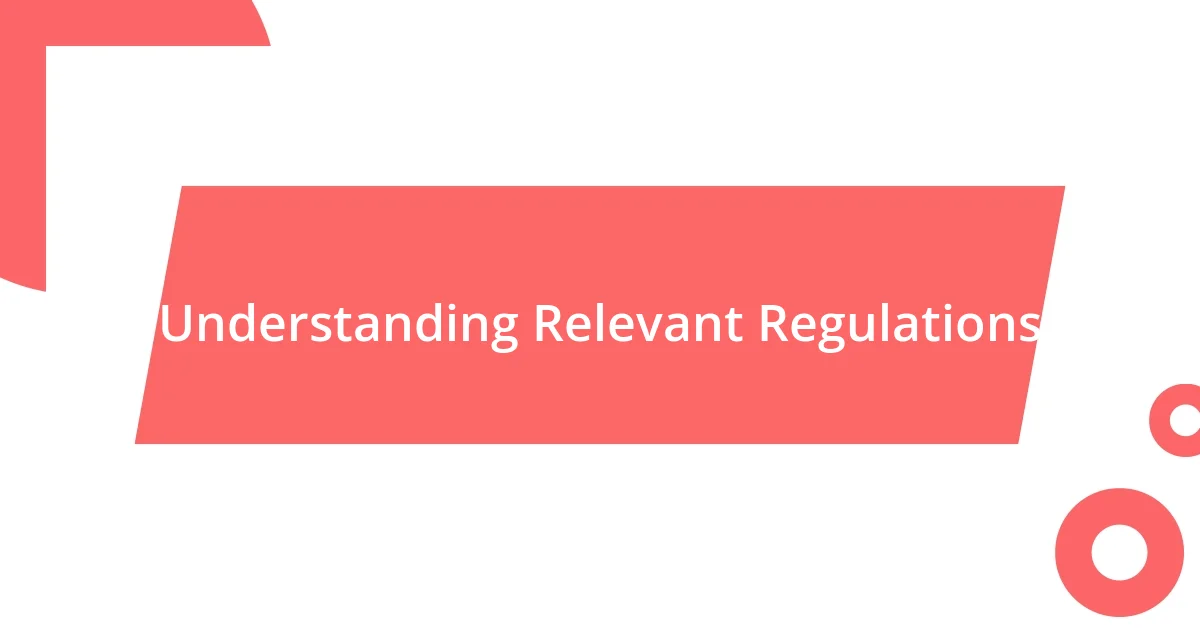
Understanding Relevant Regulations
Understanding relevant regulations is crucial in our fast-paced environment. I remember the first time I navigated a new regulation; it felt like trying to read a foreign language. The sense of confusion can be overwhelming, but it’s essential to break down the regulations into manageable pieces so that you can truly understand their implications.
Reading through regulations can sometimes feel like a chore, but I try to find ways to make it engaging. One technique that has worked for me is relating the regulations back to real-life scenarios. For example, when I encountered a compliance rule affecting marketing strategies, I visualized how it impacted my own business decisions. This shift in perspective turned something complex into a personal challenge, keeping me invested in the learning process.
Have you ever found yourself questioning why certain regulations even exist? I’ve grappled with that myself. Sometimes, examining the purpose behind a regulation provides a deeper layer of understanding, allowing me to appreciate the intent behind the rules. It’s fascinating to see how regulations shape industries and can empower us to work more ethically and efficiently.
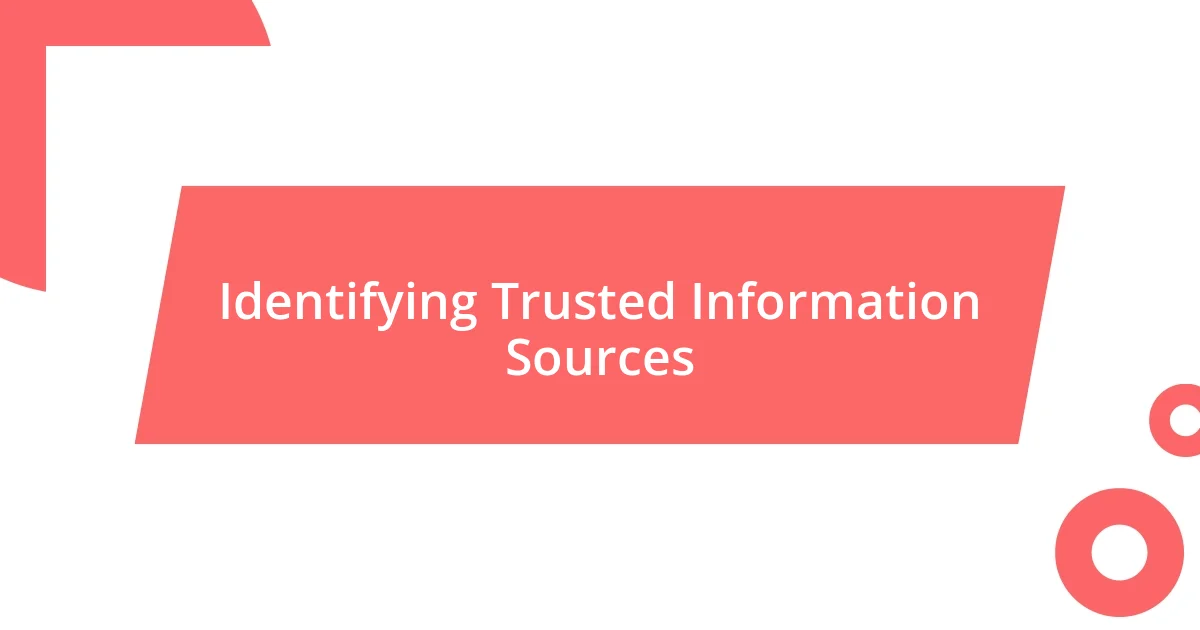
Identifying Trusted Information Sources
Identifying trusted information sources is essential for staying informed about regulations. In my experience, government websites and official publications are often the most reliable. I particularly recall a time when I relied on a state agency’s website for updates on healthcare regulations. The clarity and accuracy of the information there made a complicated situation much more manageable.
Social media can also play a role, but it’s crucial to vet the sources. I once came across a trending post on LinkedIn discussing regulatory changes, and while it generated buzz, many comments were misleading. I now make it a habit to cross-check such claims with authoritative sources, ensuring that the information I’m using is credible and up-to-date.
Additionally, industry associations frequently provide valuable insights and updates. When I joined a professional group, I was amazed by how consistently they offered guidance on compliance issues. Engaging in forums or webinars hosted by these organizations not only keeps me informed but also connects me with peers navigating similar challenges.
| Source Type | Reliability |
|---|---|
| Government Websites | Highly Reliable |
| Social Media | Variable; requires verification |
| Industry Associations | Generally Reliable |
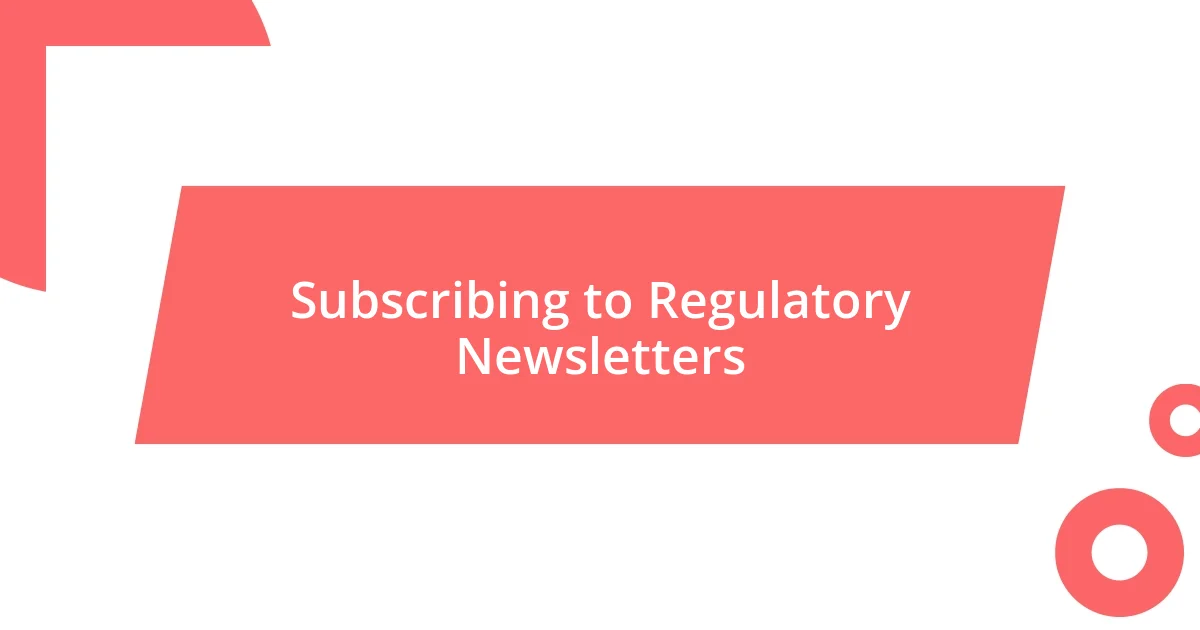
Subscribing to Regulatory Newsletters
Subscribing to regulatory newsletters has become one of my go-to strategies for staying updated on the latest changes. I distinctly remember the excitement of receiving my first newsletter from a respected regulatory agency. It felt like getting the inside scoop that not everyone had access to, and it quickly became a source of reliable information. These newsletters often summarize complex regulations into digestible formats, making it easier to track changes that could impact my work.
Here are some benefits of subscribing to regulatory newsletters:
- Timely Updates: They provide real-time information on regulatory changes.
- Curated Content: Newsletters often distill essential information, highlighting what truly matters.
- Expert Insights: Many include commentary from experts, adding depth and context to the information.
I find it reassuring to receive these insights directly in my inbox. There’s a certain comfort in knowing that I won’t miss key developments, especially in areas that can significantly affect my profession. It’s like having a knowledgeable friend who keeps you informed and ensures you’re always on the pulse of the regulatory landscape. Plus, the sense of community among other subscribers, as we all digest this information together, adds a layer of engagement that I cherish.
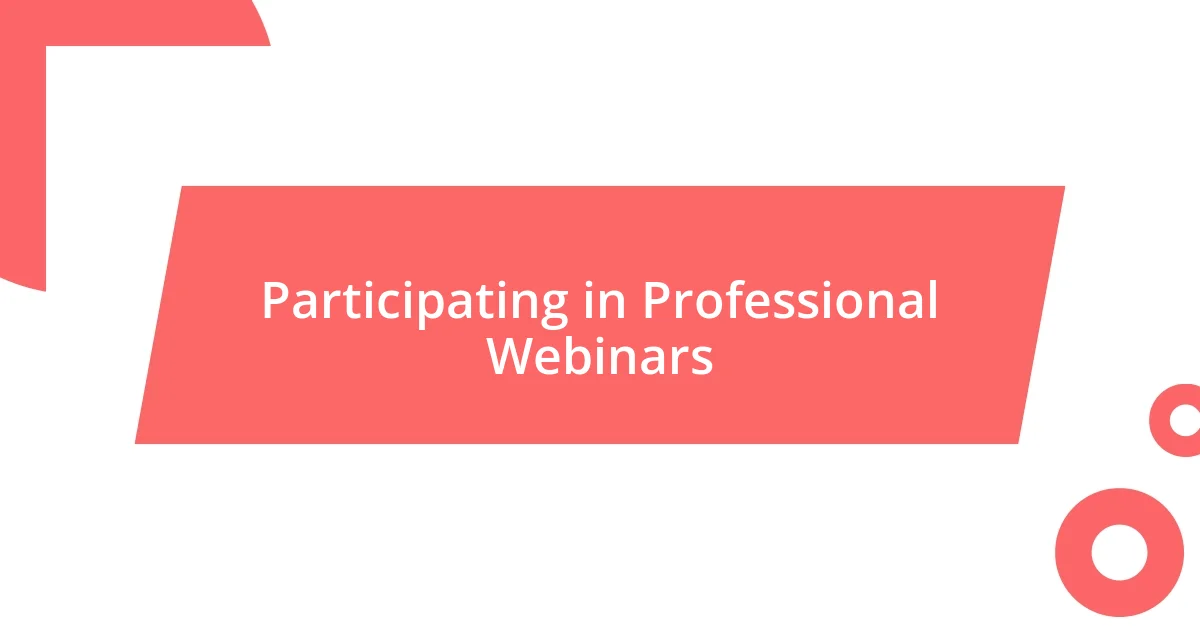
Participating in Professional Webinars
Participating in professional webinars has truly transformed how I keep abreast of regulatory changes. The first time I attended one, I was genuinely surprised by the richness of the information shared. Listening to experts discuss the implications of new regulations in real-time felt like unlocking a vault of knowledge. The ability to ask questions during the Q&A session was invaluable; it was as if I had access to a personal advisory board to clarify my doubts.
What’s even more enriching is the sense of community I feel when I connect with other attendees. I recall a particularly engaging session on compliance strategies where the interaction among participants sparked dynamic discussions. It made me realize just how critical it is to share insights and experiences. Have you ever left a webinar feeling more empowered? I certainly have, especially when I find myself inspired by the innovative approaches others have shared.
Moreover, these webinars often highlight practical examples that I can immediately apply to my own work. I remember one presenter showcasing a case study that demonstrated how a company successfully navigated a regulatory hurdle. That real-world application resonated with me – I felt more equipped to tackle similar challenges in my own role. It’s not just about consuming information; it’s about actively engaging with it and transforming it into actionable knowledge. Isn’t that what professional growth is all about?
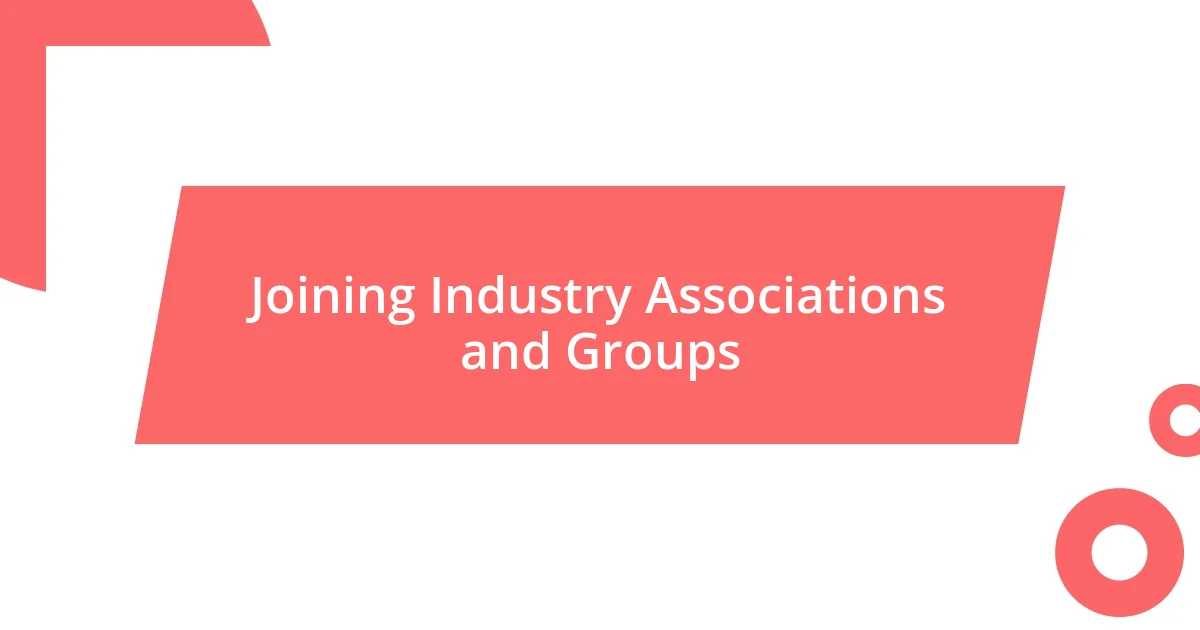
Joining Industry Associations and Groups
Joining industry associations and groups has been a game-changer for me in staying informed about regulations. I remember my first meeting, where I was surrounded by professionals who shared my passion and dedication. The energy in the room was palpable, and it sparked a sense of belonging that I had been searching for. Have you ever felt that rush when connecting with like-minded individuals? It’s empowering!
These associations provide exclusive access to vital resources like policy updates, best practices, and networking opportunities. For instance, during a recent conference, I sat in on discussions that dissected emerging regulations, which offered a fresh perspective. Hearing experts share their interpretations made complex topics feel more manageable. It’s amazing how these interactions can clarify doubts and inspire new ideas.
Furthermore, being part of these groups means I’m constantly learning from my peers’ experiences. I can’t tell you how valuable it is to hear firsthand accounts of compliance strategies or hear how others tackled similar challenges. Knowing that I’m not alone in navigating these complexities strengthens my confidence. Why reinvent the wheel when you can learn from others who’ve already paved the way?
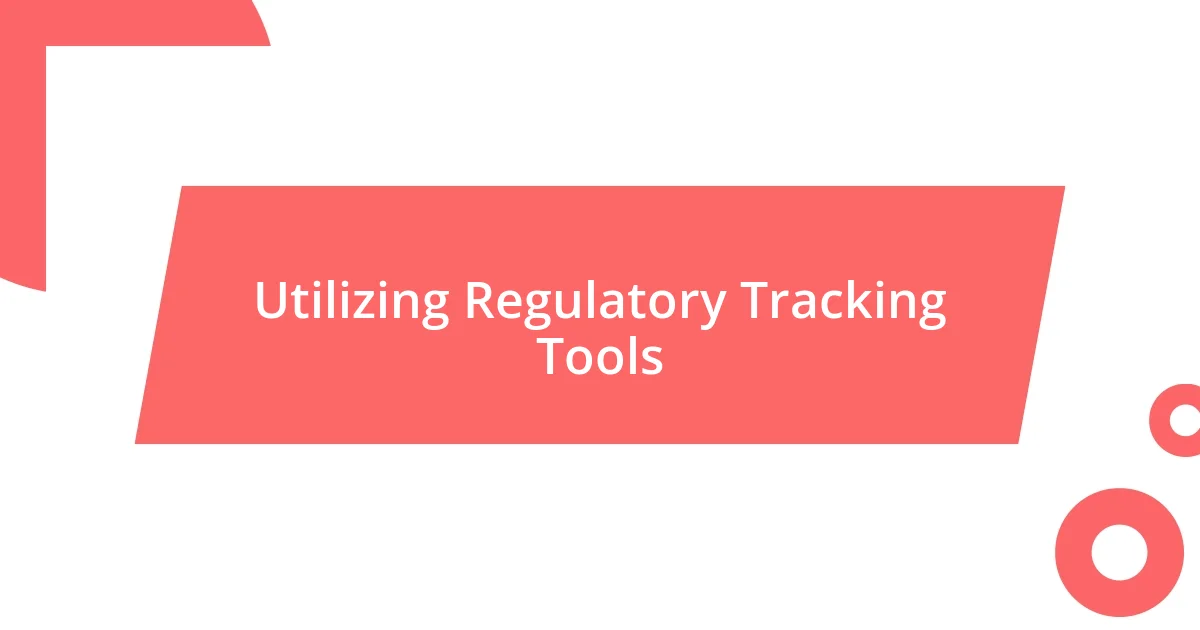
Utilizing Regulatory Tracking Tools
Utilizing regulatory tracking tools has made a significant difference in my daily routine. I first discovered these tools during a particularly hectic time when I was juggling multiple compliance projects. It felt overwhelming until I found a regulatory tracking platform that consolidated updates in one place. The first time I set it up, I remember a wave of relief washing over me as notifications began to streamline my workflow. Have you ever felt that relief when everything you need is just a click away?
I particularly enjoy leveraging features that allow me to customize alerts based on my specific industry needs. For instance, I set up automatic notifications for changes in regulations related to data privacy, which is a crucial aspect of my work. The moment I got notified of a new guideline, I felt a surge of confidence knowing I could address it promptly. It’s like having a personal assistant dedicated to my regulatory compliance, ensuring I never miss a beat. Isn’t it comforting to know that technology can simplify such complex tasks?
Moreover, many tracking tools offer analytical insights that go beyond simple updates. I recall analyzing past regulatory changes and identifying trends that indicated where the industry might be heading. This foresight helped me proactively adjust our compliance strategies rather than playing catch-up. I can’t even begin to express how empowering it feels to be ahead of the curve. Have you ever wished you could anticipate changes instead of reacting to them? That’s the kind of advantage I gain from utilizing these tools.
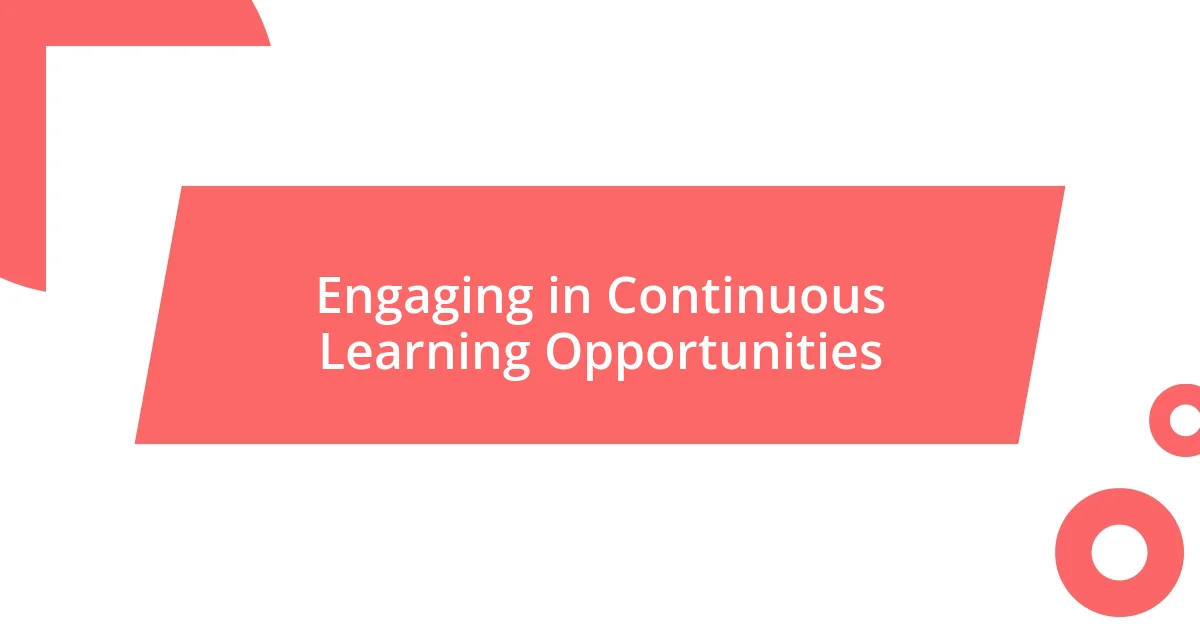
Engaging in Continuous Learning Opportunities
Engaging in continuous learning opportunities has always been a top priority for me in staying updated with regulations. I often find myself participating in webinars and online courses, especially those focused on recent shifts in the regulatory landscape. There’s something exhilarating about diving into a new topic and emerging with fresh insights that can immediately impact my work. Remember that feeling of accomplishment when you grasp a challenging concept? That’s the kind of motivation that keeps me going.
I can recall one particular online course that revolved around compliance strategies for emerging technologies. The instructor shared real-world case studies that highlighted both successful and failed approaches. It was eye-opening! I left the session not just with theoretical knowledge but actionable strategies I could implement right away. Have you ever attended a workshop that changed your perspective entirely? I’m grateful for those moments—they fuel my passion for learning and professional growth.
Moreover, I actively seek out mentorship opportunities within my industry. Having a mentor to guide me has been invaluable, offering personalized insights drawn from their own experiences. Just last month, while discussing upcoming regulatory changes, my mentor shared anecdotes from their early career days, making the subject matter feel relatable and less daunting. This connection reminds me of the importance of learning from those who have walked the path before us. Isn’t it inspiring to realize that continuous learning is not just about acquiring knowledge, but also about building relationships and sharing experiences?












